Page 1 of 1
Rawwater seacocks
Posted: Dec 29th, '09, 10:23
by gplume
On my list of boat projects this year us to finally replace the OEM gate valves seacocks for my raw water intakes with modern lever action seacocks.
What looked attactive to me is the Groco BVS series where the strainer and ball valve are integral. Anybody out there have any opinions regarding this product, or have any recomendations or the best seacock set up for the B 31 for engine raw water intakee. For a typical 31, I am assuming the 1.5 inch dia set up is the way to go....I have 1.5 inch water hoses to each engine. That said, I am thinking the OEM gate valves were actully 1.25 inch units (don't have em out yet, so not sure.). Size recomentations if not 1.5inch.
Any good tips on mounting? I saw an article recently where the guy glassed in his backing plate. When I did the washdown pump and head discharge, I just used 5200 on both sides of the backing plate, like what I removed (which I assume was std form the factroy). I bolted my last valves through in 3 places (through the flange)....any opinions on that.
Any advice welcome.
Posted: Dec 29th, '09, 11:00
by CaptPatrick
Giff,
Go with the 1 1/2" Groco Full Flow ball valve seacocks and 2" Groco external strainers, (over sizing the strainers). See:
Installing External Strainers
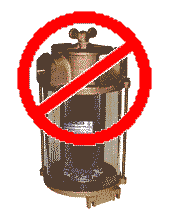
Posted: Dec 29th, '09, 13:08
by Ironman
Yes like Pat said.. I would go the 2" so if in the future you go diesel.
Also now is the time to add a crash valve.. Either add a tee to the line or use the special ball valve Groco makes.. ( I have both set ups.. You can also add a fresh water rinse ) .
Wayne
grocco flange and valve...
Posted: Dec 29th, '09, 16:04
by Joef
men:
\last year i intstalled a seacock for my raw water washdown system...3/4inch deal...but i used the grocco system where the flange is seperate from the valve. \the flange comes in all the sizes...i installed it with 5200 and 3 bronze bolts...the flange then has a male threaded section on the top where you screw on a regular fullflow ball-valve. \the nice thing (i thought) is if the valve ever gets damaged or leaky...you just unscrew the valve and screw on a new one...the flange, which is solid bronze can remain in place (which is nice considering all that 5200 and epozy resin holding it in place\0.
Posted: Dec 29th, '09, 16:46
by Rawleigh
The Groco ball valves are the nicest I have seen. I have one Groco with the crash valve and one Apollo (I got a great deal on the Groco on Ebay). The Groco is much better built.
Posted: Dec 29th, '09, 19:07
by Ironman
Rawleigh: Make sure you work that valve every 6 mo or so...they get real tight..also load them up with tef gel in side the o ring..
Wayne
Posted: Dec 30th, '09, 10:59
by gplume
Captain Patrick and all-
Thanks for the advice....Now I can start looking around for deals.
On the external strainers, any issues with growth? I keep my boat in an area with a lot of growth, so that is a concern.
All the best, and Happy New Year to all.
Giff
Posted: Dec 30th, '09, 11:12
by Brewster Minton
gplume, try and put in crash valves now if you dont have them.
Posted: Dec 30th, '09, 11:51
by In Memory Walter K
Giff- You can paint them with bottom paint when you do your bottom.
Posted: Dec 30th, '09, 14:09
by Rawleigh
Wayne: Is that on the Groco, the Apollo or both?
Posted: Dec 30th, '09, 15:29
by Ironman
All ball valves seem to get a little tight with non use but the Groco crash valves seem to be a little more so.. I dont want to fight with it during an emergency for sure.
On another boat.
I had a mussle crawl up in a ball valve & grow bigger, big trouble to say the least..
Wayne .
Posted: Dec 30th, '09, 17:24
by dougl33
Not to highjack the thread, but does anyone have a trick on winterizing with the wedge strainers? I know I can pull the hoses, but there's not a lot of room to get to the hoses and even less room to put the hose into a bucket of anti-freeze.
For the past 2 years I've crawled under the boat, removed the screen, and stuck a hose into the thru-hull. A second person standing along side the boat pours anti-freeze into the hose via a large funnel while a third person runs the engine. We used plumbers puddy to form a seal between the thru-hull and the hose to keep the engine from sucking air (not east to do).
Posted: Dec 30th, '09, 18:19
by randall
dougl33 wrote:Not to highjack the thread, but does anyone have a trick on winterizing with the wedge strainers? I know I can pull the hoses, but there's not a lot of room to get to the hoses and even less room to put the hose into a bucket of anti-freeze.
For the past 2 years I've crawled under the boat, removed the screen, and stuck a hose into the thru-hull. A second person standing along side the boat pours anti-freeze into the hose via a large funnel while a third person runs the engine. We used plumbers puddy to form a seal between the thru-hull and the hose to keep the engine from sucking air (not east to do).
i plumbed in a separate valve. i can shut off the seacock and hook up to a bucket and pipe to the other crash valve system.. the easiest thing to do is put a Y valve in the intake hose. close the main open the auxillary.
external strainers eliminate sea life in your raw water system....mostly.
Posted: Dec 30th, '09, 18:22
by In Memory Walter K
I don't have what you have, but doesn't gravity drop the raw water from the closed valve down? If you have a crash valve with a hose coming from it on the inside, open the crash valve, put the hose into a bucket of anti-freeze and run it through the engine by running it until it comes out the exhaust.
Posted: Dec 30th, '09, 20:07
by bob lico
this is how i do it; lets take port first,shut 2" raw water intake then connect 3/4" silicon hose (no kinks) to 5 gallon bucket with antifreeze and the other end to crash valve . open crash valve and motor will draw from bucket rapidly!!! when pick comes out transom exhaust tip shut engine done go to starboard takes 5minutes real easy.
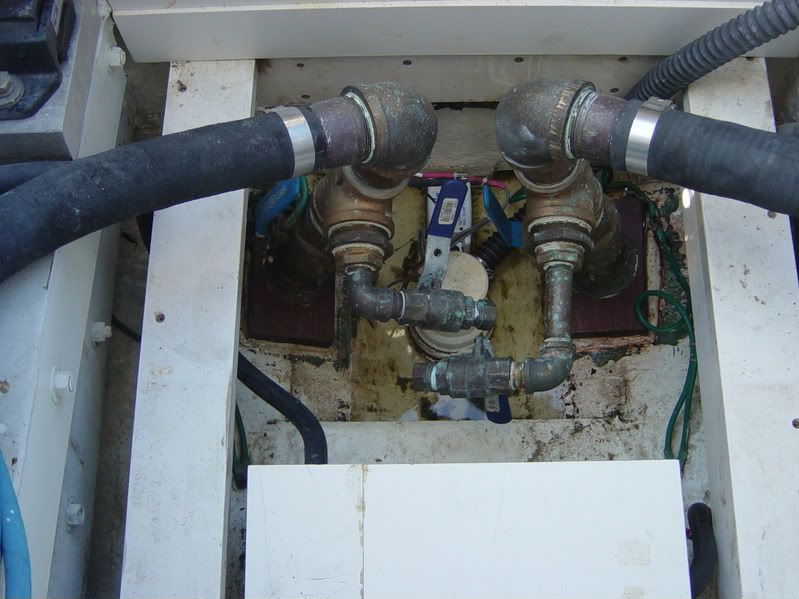
Posted: Dec 31st, '09, 06:11
by Charlie J
i just take the raw water hose off and dump 4 gals of anti freeze down the hose, shut engine down re connect hose, i do the gen the same way just have to use a funnel.
Posted: Dec 31st, '09, 09:38
by dougl33
I do not have crash valves. While I told the guy who did the re-power several specific things I wanted to do, the crash valves were not one of them. He was moving very quickly and by the time I thought about it the new wedges and sea-cocks were already in place.
Posted: Dec 31st, '09, 09:45
by bob lico
charlie the first year the boat was in the water i try that. well let me tell you those barbs on the bronze elbows molded themselves to the reininforced hose .i had to use three screwdrivers around the inside of the hose to get it off .most likely you would ruin the intergrity of the hose if you did this every year.the t-bolt clamps applied alot of pressure and this most likely contributed to the differculty of hose removal .
back to the original post i used "epi" between the 2" seacock and the bilge .my personal opinion is the locknut digs into the epi better then fiberglass and the epi reinforces the thruhole. epi unlike plywood can stay in water a thousand years unaffected (like the amazon rain forest where it originates from).
Posted: Dec 31st, '09, 10:13
by Charlie J
bob, in the spring when i replace my pumps ill change out the hoses, and may be add on llike your set up.it would be a simple add on
Posted: Dec 31st, '09, 11:36
by randall
i went one better. i plumbed a pipe a half inch off the bottom of a 5 gallon bucket ,up over the top at a right angle, ending in a common hose couple. made up another pipe that screws into the crash valve (threads on crash valve end face up) goes up, makes a right hand bend and attatches to the bucket pipe. after using the boat i close the raw water, open the crash valve and run a hose to the bucket. engine will run all day on fresh. to winterize i just dump a few gallons of antifreeze in the bucket. very easy.
Posted: Dec 31st, '09, 13:07
by bob lico
charlie give me a shout when your ready i will give you a hand .freeport marine has everything but bronze nipples .the nippes could be had at blackman plumbing.
Posted: Dec 31st, '09, 13:15
by Charlie J
thanks for the offer bob
Posted: Dec 31st, '09, 15:35
by Dug
With Crash valves, winterizing is easy as heck! I just change the valves, and drop the intakes into a 6 gallon bucket, filled with anti freeze juice. Sucks it down, blows out the ass end of the boat, and all done.
How do I know I am done?
Bucket is almost empty.
Damned straight.
Posted: Dec 31st, '09, 23:29
by JP Dalik
Bob,
Yours appear to be a winterizing adaptation rather than a true crash valve. Your set up looks very handy for winterizing.
The little sippy straws in the set up pictured would have a hard time pulling the engines potential volume of water if you really needed it. True crash valves should be the same intake diameter as the engine hose with a heavy screen to stop let's say rags or plastic from being sucked in and killing your pump. For Cummins and Yanmar say 1.5" minimum.
Further a crash valve is not ever capped off, this is due to the fact that when needed there is typically not allot of time available to get tools. If we knew when we needed a crash valve we could call it a;
"hey get down stairs and get a wrench I think we're gonna crash valve"
Anyway have a great New Year always a good time.
Posted: Jan 1st, '10, 09:25
by bob lico
happy new year jp . concerning the crash valve that is not a plug at the end it is a female adapter with internal threads of a male end of a hose so you can use a regular 5/8" hose male. that compartment in back of the battery boxes is screen and a 8" hose with a fish pond adapter normally are at the ends they are off in photo to winterize. they match the actual flow of the raw water pumps at idle . a 6" pipe would make no differance at idle.
Posted: Jan 1st, '10, 10:26
by bob lico
i wanted to add to the post above on the subject of safety concerning crash valves . we could go on forever saying" what if" so i will use percentages . i would think it has to be a million to one i run into a submerge container or what ever when backing down in the canyon so lets concern ourselves with hitting something in the forward motion and most likely at cruise speed to and from the hudson canyon.God forbid i never want my brothers to read " captain and crew were clinging to a cooler" damn i just want to built a bertram so i can do everything humanly possible to get captain and crew into the life raft with ditch bag and radio jp a sos. eperb goes off auto but i would take with me due to gps coodinates and bigest antenna made along with four insolated back up power sourses if jp is within 20 miles he coming along with other who nomally go to canyon.
the bertram has 6 bilge pumps on 4 isolated battery sourses and this year 3500gpm off ac generator. the main bulkhead is totally insolated from cockpit ,all glass in and tabed .i figured the four cockpit bilge pumps and the two crash valves would give me time to bail out safetly. the seperate foward compartment also gives me a shot at returning home with hole in bow because boat nomally rides with first 5' out of water i have no tabs (even in the up position) to keep bow up and get home.good theory but if the hole was castrophic i figure my chances increase the more i can stay on the radio . cannot expect coast guard out of sandy hook for at least 45 minutes at best.better chance of getting brewster on way in!!!so it gets down to crash valves only give more time to bail out i never intend to drive boat with crash valves feeding the engine you know and i know the probaility of keeping just enought water to the engine but not letting the water hit the starter motor (thus main positive lead in salt water) would be infinite percentage against you . if you less water you would rely on bilge pumps running and no crash valves engine cannot run more then 8 minutes without water and there would be no way to actually regulate water from bilge to run engines .
Posted: Jan 1st, '10, 10:32
by JP Dalik
I would imagine that in a situation you would want to run the engines a bit higher than idle to remove the water from the boat. That is why its important to match the intake size. Sippy straw versus Slurpee straw, both work at idle.
In a real pinch prudence would dictate the the intake capability should be enough to support WOT (in gear or not) and remove the highest volumes of water possible. Whether the boat is saved or not in the end isn't as important as the amount of time you gain to get the crew off safely.
Both of us have been in the water, it's nice to have time to get the wallet and keys and get the crew in the raft.
Posted: Jan 1st, '10, 11:12
by randall
as somene who came within a hair of actually using his crash valves last summer i'll say this. the idea was never to run with them but if i had to it could be done as long as one raw water feed was also operable. two valve handles within easy reach...........bilge low, close crash open raw. bilge high...open crash close raw. repeat as necessary. thats the theory anyway. my two 2500 GPH bilge pumps did the job......but we were lucky and had a leak we could easily control.
Posted: Jan 1st, '10, 12:33
by Brewster Minton
I ran 2" hose from my crash valves. One goes up twards the bow and the second goes to the stern. I made both about 15' long. This way I could use them to vac out differant spaces if need be, or put both where a hole might be.
Posted: Jan 1st, '10, 14:11
by bob lico
lets turn this back to percentages if you will .most likely we would run into a floating tree,skid,timber,bulkheading and the worst a piling off a pier hit lenthwise as opposed to castrophic sunken container .i would most likely lose ; one or two props,a shaft,bent rudder and possibly my biggest fear the struct pushed back opening a seam for water intrusion adding to being dead in the water.the sealed front bulkhead limits me only have to contend with cockpit water because the boat probaly rode over it and hit the running gear.i think the four 2500 gal bilge pumps and the 3500gal ac pump off the generator would definitly give me time to put raingear /blanket/cushions over the hole to at least stop the gushing water.the engines would be idling to charge batteries and possibly start pumping (incidently the take off are 1" on the crash valves , adapters are only for winterizing)as the captain i would then make decision to bail out like you said jp i been in the water and having a your head smashed and ribs broken only compounds the problem.the mind game has to controlled especially when your in a lifeline (boat racing pfd) knowing nightfall is coming and fear starts taking over.-------get the crew in the life raft f-ck the boat.
Posted: Jan 1st, '10, 22:55
by JP Dalik
At 1800 rpm the 6BT should flow roughly 70 gallons of water per minute multipy this times 2 for the savy two engine owner and you get get 8,400 gallons per hour of reliable water pumping ability. Add to that the 25-35 gallons per minute on the gen set and you have a very nice cushion when the shit hits the fan. This is without one 12v pump.
My point is simply this, don't undersize a safety feature and call it good enough for everyone, its only good enough if it maximizes the potential of the system. Otherwise its something else.
With a 1" intake the pictured set up is a nice winterizing system.
Posted: Jan 2nd, '10, 17:09
by gplume
Thanks all once again. Yup...crash valves are in my future for sure. Just need to work out the best set up. Anyone out there use a 3 way valve as a diverter? How about the Groco seacockes (SBV series) with an integral emegency valve. I am assuming thats what Iron man and Rawleigh have. You guys have any issues getting at the seacock base to access the emergency diverter? That part worries me, I am thinking my diverter needs to be up higher...similar to Bob's set up...with a larger dia pipe.
Also, does anyone out there have any pictures of their external strainer set up. I d' like to see to visualize the set up.
I am surprised you guys can run your engines off a garden hose. My old school Cummins 504's suck so much water, even at idle, thatwhen I winterize, I first run fresh water into a 5 gallon joint compond bucket hung from the rocket launchers on the bridge. This acts as a buffer. I pull the hose off the nipple from my strainers and into a swiming pool hose I connect the bucket. With my dock hose on full blast....(I lot of pressure) put into the 5 gallon bucket, which I start off full, I begin to gain on it and in 8-10 minutes, I have to shut down as I can't feed enough water to keep up with how fast the engines use water. This running at maybe 800-1000 RPM
Of course any new set up...I plan to make so I don't have to pull the hose. I am thinking the crash valve will do the winerize / fresh water flush deal, as well as add a dregree of safety. Brewsters whale shark story comes to mind often, so for sure I am sold on the crash valve idea.
Posted: Jan 2nd, '10, 20:00
by bob lico
what your looking at in the photo of my boat is the step in the capanion way in the up position(on a piano hinge).you neil on the floorboard open the step and the valves are right there . i can`t put raw water valves in engine compartment because engines are sitting within a 1" of the bilge.most of all raw water strainers have to sit on either side of keel line for least amount of "drag"not getting into hydrodynamics.
Posted: Jan 3rd, '10, 11:51
by Rawleigh
Giff: Groco also used to make an "add on" diverter that you could add above your seacock. Double valves would work just as well - it is just a matter of space.
Posted: Jan 3rd, '10, 14:18
by Carl
I just redid my raw water intake this setup this year, complete with crash pump setup...which means I am coming closer to getting diesels where I will have to pull it all out again to go with 1-1/2" intakes.
That said I needed to keep real low as my intakes are under the deck, by the tranny output. I went with Groco Seacocks plumbed to a T with a short Bronze nipple. The top of the T has a 90deg fitting which goes to the motor, the other has a full flow valve attached with a hose fitting which goes forward to the keel with a hose and strainer at the end. In the event of an emergency I shut the Rawwater valve and the other valve is right there. I can also use the hose and stick into a bucket for winterizing...only took my 16 seasons. Real nice.
I eliminated the inboard strainer, I liked to see the water flow...but the strainers under the boat have been quite effective for 16 seasons.
I choose not to go with the Seacock Crash Pump Combo as I wanted a strainer and wanted a simple way to winterize (the combo has an adapter for a hose...but seemed bothersome), also I needed to plumb into a larger compartment. Another thing that bothered me was the combo unit takes a bit more to use then just throwing a valve handle. I would not want to do... or worse have to explain how to remove the safety clip and remove plug in a situation.
You may also want to consider how and where you'll put the crash valve handle. You'll want it someplace easliy accessible yet not someplace it will get switched by accident. I put a turn of electical tape over the handle and hose to keep it from being turned by accident. The tape is enough to make you think before turning, yet can be ripped off in a pinch.
I lost an Endcap on my Heat exchangeer this year when running...boat filled up with a whole lot of water before I noticed. When I did, I grabbed for the Crash Valve and the tape gave me a second to think. Also feeling the warm water in the bilge gave me a clue as to where the water was coming in from. Point being I had my hands on the valves without really having to think too hard about where they are and what needs to be done.
Posted: Jan 3rd, '10, 20:48
by Rocky
Hi guys, has anyone ever tried to see how many GPH a typical impeller can pump say, 2500 RPM? I'm just curious compared to a good high volume bilge pump. Seems every boat should have a crash valve given the simplicity and effectiveness in an emergency!
Posted: Jan 3rd, '10, 21:00
by Rocky
Sorry JP, I meant to say gas engine capabilities for GPH. Would that be similar to your diesels?
Posted: Jan 10th, '10, 19:54
by Ironman
Changing fuel filters today & took a few pic s of my crash valves..
http://i130.photobucket.com/albums/p245 ... ves016.jpg
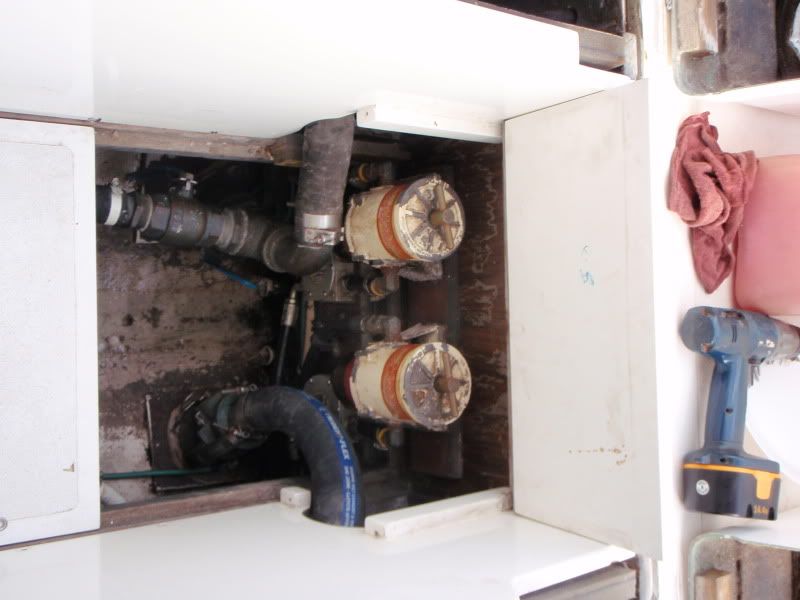
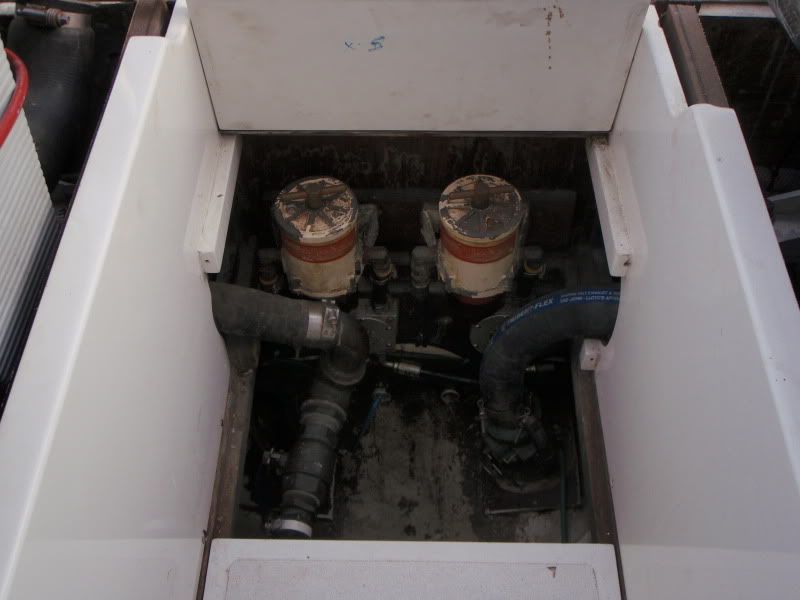
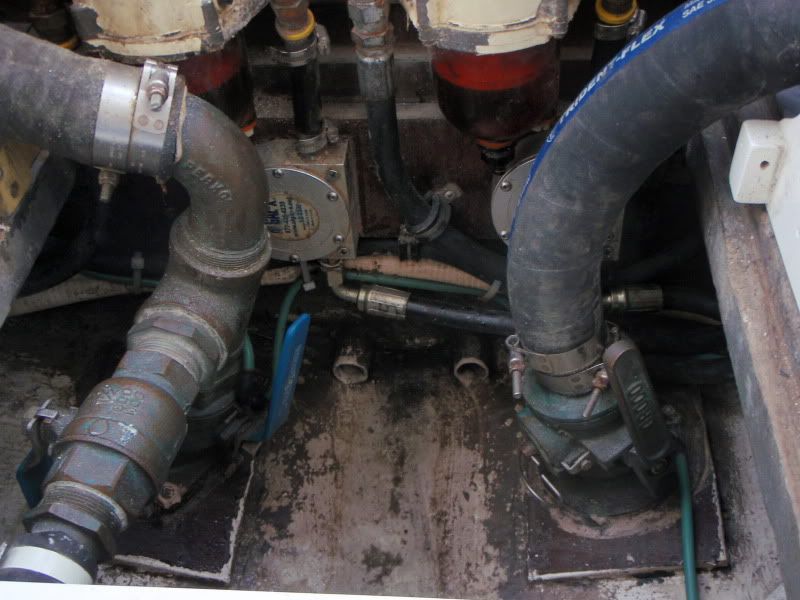
Hope this helps
Wayne
Posted: Jan 10th, '10, 20:48
by gplume
Thanks Wayne - Much appreciated.
Posted: Jan 12th, '10, 20:36
by CaptPatrick
Gif,
Sorry to be slow in posting the setup on Hancock's B31 crash valves, but I didn't have good images until today... First decent weather day I've had in a couple of weeks.
http://bertram31.com/hancock/img/cockpi ... sh_valves/
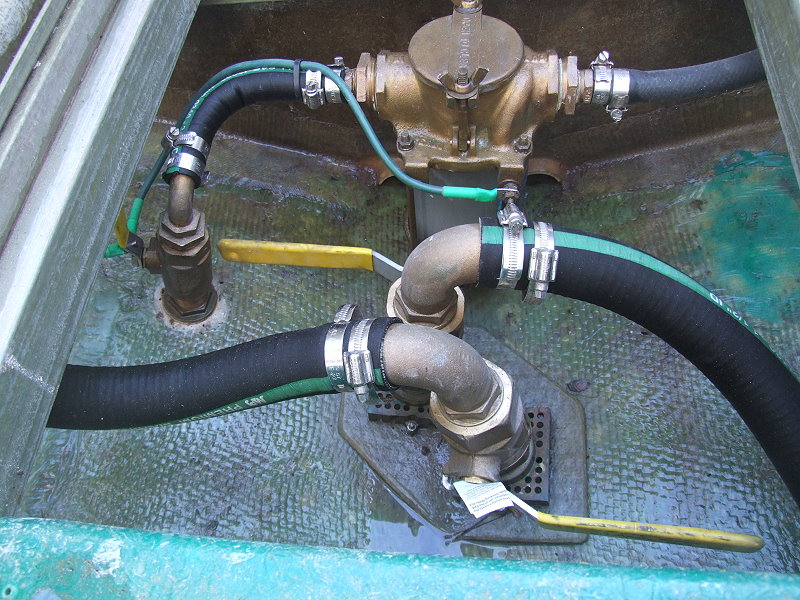
Posted: Jan 12th, '10, 21:10
by Tony Meola
Capt. Pat
What did you use for strainers? Never seen anything like that. How did you fasten them in place?
Posted: Jan 12th, '10, 21:42
by CaptPatrick
Both Perko and Grocco make bronze bilge strainers... These are Perko.

Since I didn't want to screw them to the hull, nor have them up high on a 3/4" pad, I made a 1/4"" thick fiberglass casting of the bilge. Then made stainless plates with machine screws welded on & installed from the back side of the fiberglass plate to act as studs. The fiberglass plate was then epoxied to the hull.
For details, see: http://bertram31.com/hancock/img/cockpi ... omp_bilge/
.
Posted: Jan 12th, '10, 22:27
by Tony Meola
Capt. Pat
Great way of fixing them in. Thanks
Posted: Jan 12th, '10, 23:14
by coolair
I mean seriously?? even your bilge work is just absolutely beautiful! I mean seriously its a thing of beauty
Posted: Jan 14th, '10, 04:31
by gplume
Captain Patrick - Thanks. One question, where abouts are the pickups located. I am guessing the rear of the boat?,,,but not sure.
Posted: Jan 14th, '10, 04:47
by CaptPatrick
The raw water intakes are aft of the engine compartment and inboard of the shafts...
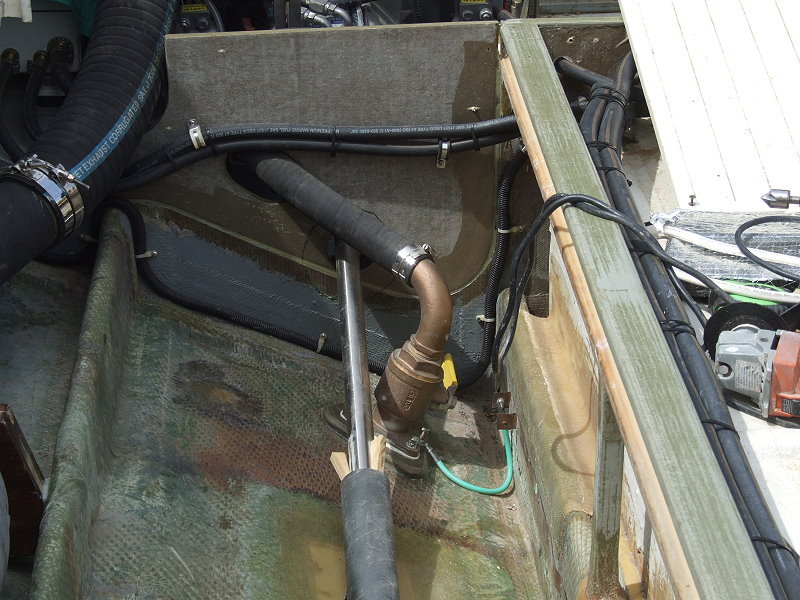
Posted: Jan 14th, '10, 10:38
by 34Hatt
Brewster Minton wrote:I ran 2" hose from my crash valves. One goes up twards the bow and the second goes to the stern. I made both about 15' long. This way I could use them to vac out differant spaces if need be, or put both where a hole might be.
I like that Idea and know just how to do mine. Well there's another job to do but this stuff is worth it just may save your butt some day.
Posted: Jan 14th, '10, 12:45
by Ironman
yup Brewsters got the trick.. I put a 2foot hose on but will lenghten it
fwd







